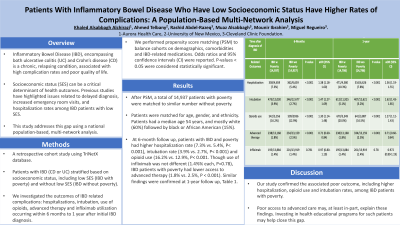Tuesday Poster Session
Category: IBD
P4310 - Patients With Inflammatory Bowel Disease Who Have Low Socioeconomic Status Have Higher Rates of Complications: A Population-Based Multi-Network Analysis
Tuesday, October 29, 2024
10:30 AM - 4:00 PM ET
Location: Exhibit Hall E

Has Audio

Khaled Alsabbagh Alchirazi, MD
Aurora Healthcare
Brookfield, WI
Presenting Author(s)
Khaled Alsabbagh Alchirazi, MD1, Ahmed El Telbany, MD, MPH2, Rashid Abdel-Razeq, MD3, Muaz Alsabbagh, MD3, Miguel D Regueiro, MD3
1Aurora Healthcare, Brookfield, WI; 2University of New Mexico, Albuquerque, NM; 3Cleveland Clinic, Cleveland, OH
Introduction: Inflammatory Bowel Disease (IBD), encompassing both ulcerative colitis (UC) and Crohn’s disease (CD) is a chronic, relapsing condition, associated with high complication rates and poor quality of life. Socioeconomic status (SES) can be a critical determinant of health outcomes. Previous studies have highlighted issues related to delayed diagnosis, increased emergency room visits, and hospitalization rates among IBD patients with low SES. Comprehensive, population-based studies examining the correlation between SES and complication rates in IBD remain scarce. This study addresses this gap using a national population-based, multi-network analysis.
Methods: We performed a retrospective cohort study using a large federated de-identified health research database, TriNetX. We identified patients with a diagnosis of IBD (CD or UC) and stratified them based on socioeconomic status, including low SES (IBD with poverty) and without low SES (IBD without poverty). We investigated the outcomes of IBD related complications: hospitalizations, intubation, use of opioids, advanced therapy and infliximab utilization occurring within 6 months to 1 year after initial IBD diagnosis. We performed propensity score matching (PSM) to balance cohorts on demographics, comorbidities and IBD-related medications. Differences between the two cohorts were calculated using t-test, chi-square/Fisher's exact test. Odds ratios and 95% confidence intervals (CI) were reported. P-values < 0.05 were considered statistically significant.
Results: After PSM, a total of 14,937 patients with poverty were matched to similar number without poverty. Patients were matched for age, gender, and ethnicity. Patients had a median age 54 years, and mostly white (60%) followed by black or African American (15%). At 6-month follow up, patients with IBD and poverty had higher hospitalization rate (7.3% vs. 5.4%, P< 0.001), intubation rate (3.9% vs. 2.7%, P< 0.001) and opioid use (16.2% vs. 12.9%, P< 0.001. Though use of infliximab was not different (1.4%% each, P=0.78), IBD patients with poverty had lower access to advanced therapy (1.8% vs. 2.5%, P < 0.001). Similar findings were confirmed at 1-year follow up, Table 1.
Discussion: Our study confirmed the associated poor outcome, including higher hospitalization, opioid use and intubation rates, among IBD patients with poverty. Poor access to advanced care may, at least in-part, explain these findings. Investing in health educational programs for such patients may help close this gap.
Note: The table for this abstract can be viewed in the ePoster Gallery section of the ACG 2024 ePoster Site or in The American Journal of Gastroenterology's abstract supplement issue, both of which will be available starting October 27, 2024.
Disclosures:
Khaled Alsabbagh Alchirazi, MD1, Ahmed El Telbany, MD, MPH2, Rashid Abdel-Razeq, MD3, Muaz Alsabbagh, MD3, Miguel D Regueiro, MD3. P4310 - Patients With Inflammatory Bowel Disease Who Have Low Socioeconomic Status Have Higher Rates of Complications: A Population-Based Multi-Network Analysis, ACG 2024 Annual Scientific Meeting Abstracts. Philadelphia, PA: American College of Gastroenterology.
1Aurora Healthcare, Brookfield, WI; 2University of New Mexico, Albuquerque, NM; 3Cleveland Clinic, Cleveland, OH
Introduction: Inflammatory Bowel Disease (IBD), encompassing both ulcerative colitis (UC) and Crohn’s disease (CD) is a chronic, relapsing condition, associated with high complication rates and poor quality of life. Socioeconomic status (SES) can be a critical determinant of health outcomes. Previous studies have highlighted issues related to delayed diagnosis, increased emergency room visits, and hospitalization rates among IBD patients with low SES. Comprehensive, population-based studies examining the correlation between SES and complication rates in IBD remain scarce. This study addresses this gap using a national population-based, multi-network analysis.
Methods: We performed a retrospective cohort study using a large federated de-identified health research database, TriNetX. We identified patients with a diagnosis of IBD (CD or UC) and stratified them based on socioeconomic status, including low SES (IBD with poverty) and without low SES (IBD without poverty). We investigated the outcomes of IBD related complications: hospitalizations, intubation, use of opioids, advanced therapy and infliximab utilization occurring within 6 months to 1 year after initial IBD diagnosis. We performed propensity score matching (PSM) to balance cohorts on demographics, comorbidities and IBD-related medications. Differences between the two cohorts were calculated using t-test, chi-square/Fisher's exact test. Odds ratios and 95% confidence intervals (CI) were reported. P-values < 0.05 were considered statistically significant.
Results: After PSM, a total of 14,937 patients with poverty were matched to similar number without poverty. Patients were matched for age, gender, and ethnicity. Patients had a median age 54 years, and mostly white (60%) followed by black or African American (15%). At 6-month follow up, patients with IBD and poverty had higher hospitalization rate (7.3% vs. 5.4%, P< 0.001), intubation rate (3.9% vs. 2.7%, P< 0.001) and opioid use (16.2% vs. 12.9%, P< 0.001. Though use of infliximab was not different (1.4%% each, P=0.78), IBD patients with poverty had lower access to advanced therapy (1.8% vs. 2.5%, P < 0.001). Similar findings were confirmed at 1-year follow up, Table 1.
Discussion: Our study confirmed the associated poor outcome, including higher hospitalization, opioid use and intubation rates, among IBD patients with poverty. Poor access to advanced care may, at least in-part, explain these findings. Investing in health educational programs for such patients may help close this gap.
Note: The table for this abstract can be viewed in the ePoster Gallery section of the ACG 2024 ePoster Site or in The American Journal of Gastroenterology's abstract supplement issue, both of which will be available starting October 27, 2024.
Disclosures:
Khaled Alsabbagh Alchirazi indicated no relevant financial relationships.
Ahmed El Telbany indicated no relevant financial relationships.
Rashid Abdel-Razeq indicated no relevant financial relationships.
Muaz Alsabbagh indicated no relevant financial relationships.
Miguel D Regueiro: AbbVie – Advisory Committee/Board Member, Consultant, Speakers Bureau.
Khaled Alsabbagh Alchirazi, MD1, Ahmed El Telbany, MD, MPH2, Rashid Abdel-Razeq, MD3, Muaz Alsabbagh, MD3, Miguel D Regueiro, MD3. P4310 - Patients With Inflammatory Bowel Disease Who Have Low Socioeconomic Status Have Higher Rates of Complications: A Population-Based Multi-Network Analysis, ACG 2024 Annual Scientific Meeting Abstracts. Philadelphia, PA: American College of Gastroenterology.
